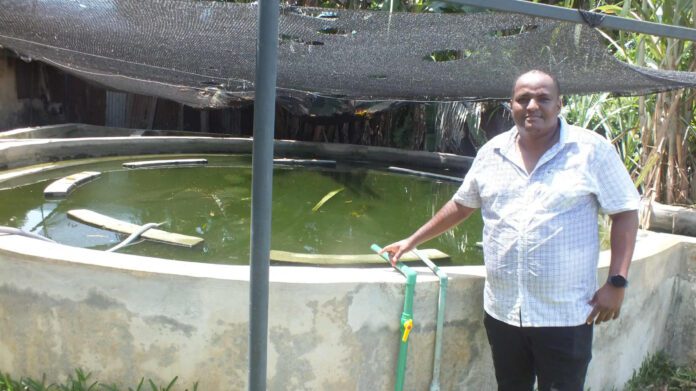When Paul Muarage earned his bachelor’s degree in Business Administration from the United States International University (USIU-Africa), he joined his family’s construction business.
However, down the line, an untapped passion in aquaculture would soon lead him to a different direction which saw him establish his own fish farming enterprise in Kilifi County. Paul Murage is the owner of Pwani Fish Farm and Hatchery.
His life took a turn to aquaculture in 2013 when Murage was involved in a road car accident. From the ordeal, Murage received a settlement of Sh. 300,000 which he pumped in as the seed capital for the fish farm.
“My dad had constructed one pond and stocked it, but all the fish died. It became a challenge for us to solve. Although I had a passion for rearing fish, I didn’t have the capital until I was involved in the accident,” Murage recalled.
Before getting deeply involved in the enterprise, he visited the Kenya Marine Fisheries and Research Institute to gain knowledge. He also sought the counsel of fish farmers in Mtwapa.
Armed with enough information, he bought 500 tilapia fingerlings and some goldfish fingerlings which he put in a concrete pond.
More than a decade later since the business began, he now rears tilapia, catfish fingerlings and some ornamental fish such as goldfish, black mollies and koi carps.
Pwani Fish Farm & Hatchery has a monthly production capacity of between 150,000 to 200,000 fingerlings. In the near future, Murage is targeting 600,000 fingerlings monthly.
“We are looking for partners who we will collaborate with to ensure that this dream comes true. Once we find them, we will be good to go,” he said.
Currently, the farm has a mix of 5 liner ponds, many concrete ponds, 5 tilapia breeding tanks and 30 smaller tanks. The original batch of fingerlings at the aquaculture farm were sourced from Sagana. Paul Murage also imported male-only tilapia from Til-Aqua in the Netherlands.
Sustainability is central to Murage’s fish-feeding practices. They use Unga Feeds and other commercial feeds from Nairobi. The diet is supplemented by Black Soldier Flies (BSF) which are reared at the farm.
Umoja Lady Making Sh 40,000 Per Day Selling Fresh Fish
“We aim to cut our feed cost by about 50% through using soldier flies. We started BSF farming three years ago. We spent Sh. 10,000 to buy the first colony. We feed them fruit waste and wheat bran, among other feeds,” he continued.
He noted that fish farming is an intensive operation that requires adequate care. Some of the best practices include checking the water levels in the pond daily, monitoring temperatures and oxygen levels, cleaning the pond and feeding the fingerlings thrice a day.
There is also concern about fish predators but Murage has taken active measures to counteract them.
Pwani Fish Farm sells fingerlings to farmers and farmers’ groups. They are currently exploring opportunities in the ornamental fish market.
“We sell the tilapia fingerlings for Sh. 10 each and catfish fingerlings for Sh. 15 each. In terms of ornamentals, we sell the common goldfish for Sh. 150 per inch and the koi carp for between Sh. 350 and Sh. 400 per piece,” he noted.
He advised aspiring fish farmers to keep their eyes peeled for opportunities while exercising resilience and patience. Murage explained that returns are not straightforward but with time, the money comes.
“Actually, aquaculture is about the water quality. So if you don’t use quality cold water, you will lose fish. If the water is not clean and there is a bit of mismanagement, you will have a big crisis,” he concluded










